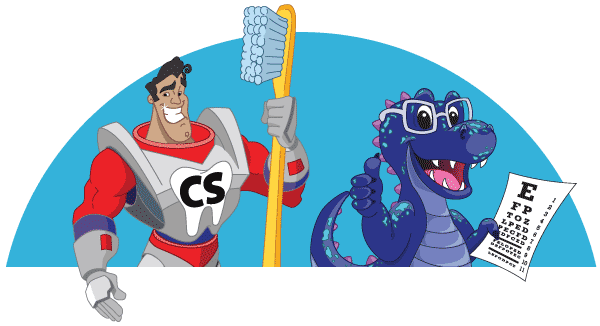Dental Care for Infants
Milestones and Healthy Habits

The first year of your baby’s life is filled with lots of firsts (first time eating solid food, crawling and more), well baby visits at the pediatrician and hopefully not too many sleepless nights. One of the things that is easy to overlook in your baby’s first year is how best to care for their gums and the teeth they will eventually get. We want to make it easy for you to care for your baby’s teeth and gums. Here are some milestones and healthy habits for baby’s first year from your dentist.
Milestones
Babies are typically born with 20 baby teeth (also called primary teeth) but they are under the gums and you can’t see them until they break through the gums, called tooth eruption. The first one usually breaks through (when your baby is teething) by 6 months, but the exact timing varies for each child. Usually, all the baby teeth are in by 2 to 3 years of age.
Teething can be very uncomfortable for babies. It can make them irritable, not sleep or eat well and even have a low-grade temperature or diarrhea. Usually the first teeth to break through the gums and the molars create the most discomfort for babies.
It can be easy to mistake teething symptoms for a cold. Many babies who are teething will drool a lot and that excess drool can cause a rash. Do your best to keep your baby’s mouth, chin, cheeks and neck as dry as possible. Chapped and sore skin can be relieved by applying a barrier cream.
Teething babies love to bite down on anything—even you—to relieve the pressure they feel under their gums. Give them something cold to bite down on such as teething rings and chew beads. The coldness can numb the pain as well.
Healthy Habits
Good dental health starts even before you your baby has any teeth showing. At least twice a day but ideally after every feeding, wipe your baby’s gums with a damp piece of a clean cloth or fresh gauze. This helps remove harmful bacteria that could eventually create cavities.
As soon as the first tooth pops through, start using a soft-bristled toothbrush with water. Dentists recommend brushing thoroughly two times per day as teeth erupt and once a child has 10 or more teeth, brushing for two minutes twice per day. You should floss between teeth as soon as your little one has two teeth next to each other. Additionally, the American Academy of Pediatric Dentistry recommends that your child receive a dental examination two times per year.
Schedule an appointment with a dentist as soon as that first tooth pops through the gums or by your child’s first birthday.
Not only does visiting the dentist at this age help your child get comfortable at the dentist’s office, but the dentist is also able to examine your child’s mouth to ensure teeth are coming in as they should.
What You Need to Know
It’s important to take care of your baby’s teeth even though they will eventually fall out to make room for permanent teeth. A child’s primary teeth help them chew food easily and pronounce words correctly. These teeth are placeholders in the jaw for the permanent teeth to come through.
The outer layer (enamel) of a baby tooth is not as strong as the enamel of permanent teeth. Although this makes baby teeth look whiter, they are also more likely to get tooth decay.
Do not put a baby to sleep with a bottle. The sugars from juice, milk or formula will stay on the teeth for hours and could lead to tooth decay. Decayed baby teeth can even damage the permanent teeth that are under the gums.

